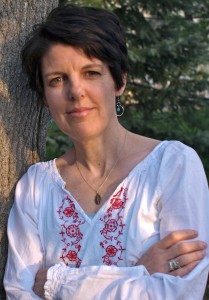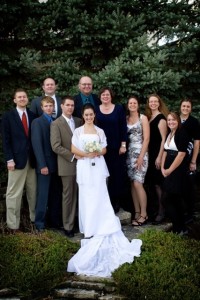Last weekend, I was on a two-night campout with my younger daughter’s American Heritage Girls troop. And truly, I had a great time. I would say so even if my whole family, children included, did not read my blog.
But, to be honest, before this, I used to say to people, “You know, the closest I get to camping is Hampton Inn.” I love the outdoors, but I really like to come home to my own bed, or a Hampton Inn. Some of you will know what I mean.
Even though I was officially having fun, after the first restless night with lots of little girls tossing and turning and needing to go use the latrine, I was pretty tapped out during a lull on Saturday afternoon. So I might have hiked the half-mile to the minivan to take refuge for a little bit of quiet and non-outdoors. I am sooo glad that I did. That’s because I caught the very end of The Moth Radio hour. I generally stay away from The Moth, as I generally find it a more pretentious and annoying version of This American Life. While I love and find so Catholic and catholic, so many of the stories on TAL, it can also occasionally veer into the annoying category.
So my first random thought is to share this and invite you to take a few minutes to listen to “Before Fergus,” Lynn Ferguson’s story of when she was pregnant at an “advanced maternal age.” Listen if for no other reason than to hear her Scottish brogue. Lovely. Sitting there listening to it, and having a few minutes of quiet, was just enough to help me get back to several dozen energetic girls, the campfire, and sleeping in a bunk.
More randomness:
Do our Kids Get Off Too Easy? –Alfie Kohn, The New York Times.I found his book Punished by Rewards: The Trouble with Gold Stars, Incentive Plans, A’s, Praise, and Other Bribes
that I read many, many years ago, utterly fascinating, and it really informed how I parent, I think because I was parented this way, without my parents having the benefit of such a book. “Other researchers, meanwhile, have shown that high self-esteem is beneficial, but that even more desirable is unconditional self-esteem: a solid core of belief in yourself, an abiding sense that you’re competent and worthwhile — even when you screw up or fall short.”
Always Hungry? Here’s Why–The New York Times “If this hypothesis (that “rapidly digestible carbs” are the cause of hunger & weight gain) turns out to be correct, it will have immediate implications for public health. It would mean that the decades-long focus on calorie restriction was destined to fail for most people. Information about calorie content would remain relevant, not as a strategy for weight loss, but rather to help people avoid eating too much highly processed food loaded with rapidly digesting carbohydrates. But obesity treatment would more appropriately focus on diet quality rather than calorie quantity.”
The ‘Casket Catechesis’ of John Paul II–National Catholic Register. Not new but read-worthy. A man inspired to start a simple casket business after seeing the casket of John Paul II. “I hope that Marian Caskets is a part of this spiritual awakening, where death is accepted but where it won’t have the last word. That’s what the casket catechesis of soon-to-be St. John Paul II is all about: facing reality with humility, acknowledging our sins and asking for God’s mercy.”
18 Reasons Why This Skeptical Pediatrician Came to Love Homeschooling Dr. Kathleen Berchelmann, Aleteia. My brother sent me this article and I found it really interesting and well-argued. I still felt a little exhausted just reading about this family’s schedule though! Neat connection: Kathleen attended the 2012 Behold Conference. I got to meet her but not spend much time with her.
Who Gets to Graduate? –Paul Tough, The New York Times magazine. Helping the most-at-risk kids to graduate. I haven’t finished this one yet, but I find it fascinating, and want my teens to read.
What have you read or listening to randomly this week?







